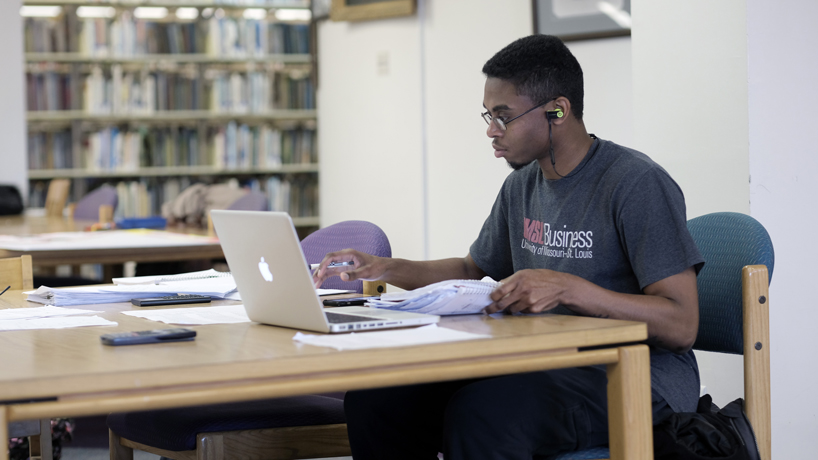
Associate Professor Ekin Pellegrini utilized the Collaborative Online International Learning program, pioneered by the State University of New York COIL Center, to bring together 55 UMSL business students and 85 business students from the Universidad Anáhuac México. During the innovative online course, students collaborated on a six-week project that spanned multiple international business disciplines such as cross-cultural leadership, finance, marketing and supply chain management. (Photo by August Jennewein)
Both parties had come to the table several times, and Larry Sutton Jr. was confident his side had brokered a favorable deal – $7.95 a unit for handmade beaded bracelets crafted by Mexican artisans.
Sutton estimated the bracelets could sell for $80 to $100 in certain American boutiques, providing a tidy profit.
It seemed like a decisive win until he spoke to his Mexican counterpart after the deal was done. Apparently, the Americans could have had the bracelets at $4 a piece if they were willing to haggle a bit more aggressively.
The negotiation wasn’t part of a wily entrepreneur’s new venture into international markets, though. Rather, the exercise was part of Associate Professor Ekin Pellegrini’s “MGMT/INTLBUS 3680: International Management” course this spring at the University of Missouri–St. Louis.
Pellegrini utilized the Collaborative Online International Learning program, pioneered by the State University of New York COIL Center, to bring together 55 UMSL business students, including Sutton, and 85 business students from the Universidad Anáhuac México in Mexico City.
During the innovative online course, students collaborated on a six-week project that spanned multiple international business disciplines such as cross-cultural leadership, finance, marketing and supply chain management.
The students were divided into 18 cross-cultural teams to work on a variety of assignments, the most important being a mock negotiation where the Universidad Anáhuac students acted as vendors selling a Mexican product to UMSL business students, who were buyers responsible for marketing the product in the U.S.
Pellegrini said the experience differed significantly from typical international business courses, which primarily rely on lectures and business case studies.
“The text book information is very important, and we have access to world renowned international business resources, so the theoretical part is there,” she said. “However, the practical experience of doing international business is also essential.”
Initially, it was challenging to find a way to provide a hands-on international business experience during an online course in the age of COVID-19. After searching for resources, Pellegrini came across the SUNY COIL Center.
SUNY established the model more than 15 years ago. It focuses on connecting professors in different countries, who then develop collaborative projects and discussions as part of their coursework. The projects use online tools to help students explore different cultural perspectives and become globally engaged.
Keeta Holmes, director of the Center for Teaching and Learning, and Liane Constantine, interim executive director of UMSL Global, helped Pellegrini with the initial technology set up. Pellegrini decided to partner with Universidad Anáhuac because both universities are in the same time zone, making coordination between both groups of students easier.
At first, there seemed to be some hesitance among the class. The UMSL students weren’t sure how smoothly they would be able to communicate with their Mexican counterparts, while others were worried about applying theoretical concepts to practice.
However, their worries – and assumptions – were quickly put to rest.
“They told me that they were scared at first,” Pellegrini said. “They didn’t know what to expect. They said their preconceived notions about Mexicans were completely destroyed. I think this COIL project, if anything, was the best way to break down stereotypes. Mexican students had stereotypes about American college students, too. They were so surprised to learn a lot of the students were working full-time and some of them have two jobs and some of them have kids. The Mexican students shared, ‘These are not the college students we see in movies.’”
The groups, made up of a handful of students from each university, bonded soon after meeting digitally. Sutton’s group and Adriana Plavsic’s group both chose to communicate over WhatsApp and Zoom. One of the project’s first assignments, filming a five-minute “day in the life” video, was instrumental in forging connections.
“It was so great getting to know these different people and also learning that they were so different, like we are here,” Sutton said. “Somebody from California is so different from somebody in Texas. You learn that those cultural differences exist outside our borders, as well and to stop looking so much at just Mexico. Now you’re looking more specifically. Are they in central Mexico? Are they on the coast? Where are they?”
Plavsic, a member of the UMSL women’s basketball team, added that it was even enlightening to see how fellow UMSL students’ days differed from her life as a student-athlete.
The ease of collaboration despite the distance and cultural differences was refreshing for Sutton and Plavsic. They’ve both disliked group projects in the past because of common pitfalls such as miscommunication and unequal division of labor.
“I hate group projects with a passion,” Sutton said. “This is the only one I’ve ever done that I actually enjoyed, that I felt was useful. It was beneficial to my learning experience. We still have our group chat on WhatsApp, and we still send messages back and forth.”
To his relief, regimented assignments with clear goals and deadlines kept the group focused, and the Universidad Anáhuac students were also eager to take charge. Sutton, a non-traditional student who leads a local accounting firm, said he has often had to take on the bulk of responsibility for past group projects, but that wasn’t the case this time.
His group created a standing Zoom meeting on Thursday nights where they hammered out the details of that week’s assignment. Sometimes it involved jointly writing and editing an essay in real time through a shared document. Other times it meant rehearsing and then recording a video presentation. No matter the task, the job was done by Monday.
Plavsic’s group was similarly motivated.
“Sometimes when you’re paired up with people they don’t pull their weight,” she said. “But, in my case, in my group, we had a good core group of eight people and work got evenly split.”
Pellegrini suspects that it helped to partner with a group of Mexican students who were broadly knowledgeable about American current affairs. She noted that they were able to discuss events such as the Super Bowl and the most recent presidential election.
Though there was a learning curve.
UMSL students had to learn to speak more deliberately, using more common words and relying less on idioms. Additionally, as Sutton found out, they underestimated the Universidad Anáhuac students’ negotiation skills.
“I’ll tell you what, they were smooth,” he said. “They start bartering from the youngest ages. Here in America, we just look at the price tag when we go to the store, and that’s what we pay. They’re used to bartering. They’re used to negotiation.”
The experience showed the students that they were capable of applying their classroom knowledge – even if they could have secured a better deal – and working beyond their own borders.
“Our students at UMSL told me that they started out with a little bit of anxiety, and now they said they feel they have the resources to be engaged with cross-cultural teams,” Pellegrini said. “They feel confident about their skills, and not only that, they want to engage in international business. Some of them told me that they have made lifelong friends, and as soon as this pandemic is over, they want to visit them. It just makes me so happy because they were able to create these close connections online.”
Pellegrini added that the eagerness and curiosity that the COIL project sparked will be essential in her students’ careers, not just in international business but in any workplace.
She’s grateful that UMSL has been able to find a way to remain globally connected during the pandemic and believes COIL can continue to be an impactful, cost-effective way to provide international experiences for students who don’t have the time or resources to study abroad.
“This pandemic has taught us so much,” Pellegrini said. “We can create new opportunities with remote work. Companies have done this, so why not use these new strategies in the classroom and give confidence to these students that you can do it. You don’t really have to travel for a hands-on cross-cultural experience. We can give you those skills and that experience right here in the classroom.
“Seeing students transforming in front of your eyes, telling you that they feel much more confident and ready to enter international business – there is nothing more touching, nothing more special to a teacher. Being able to give this to 55 students is an incredible experience. Many of those students did not have any international exposure. Now they do, and for free.”
The COIL project concluded weeks ago, but Sutton is already looking at the connections he’s made for the future.
“I really enjoyed the whole experience,” he said. “I feel like I’m connected with these six students in Mexico, moving forward from here on out. If I decide I do want to get into the Mexican market, they’re going to be the first people I call, ‘I’ve got this idea. What should I do? Where should I go?’ I got to learn about them, they got to learn about me, and I was kind of sorry to see it end.”














